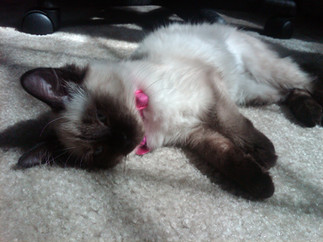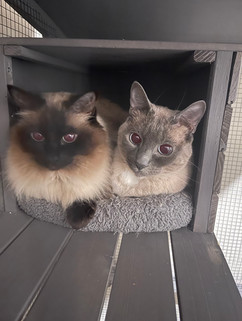In Honor of Nestlee
- Matthew L. Tinkham Jr.

- Jun 29, 2024
- 7 min read

In Honor of Nestlee
(2011—June 28, 2024)
On Tuesday, June 18, 2024, I took both of my Siamese cats, Nestlee and Winter, for their annual veterinary check-up. When physically examining Nestlee, the doctor discovered a mass in her abdomen. While surprising and discouraging, this is not something new for her. A few years ago, a similar situation happened, after which Nestlee had a necrotic mass surgically removed from her abdomen that was connected to a very swollen lymph node. The biopsy showed that it very likely had been lymphoma, but my veterinarian skillfully and successfully removed it in totality. Nestlee recovered fully without any complications.
So, last week, our worst fear was that the lymphoma had returned. The doctor ran multiple blood and urine tests and took X-rays to see if we could understand more about this new mass. She determined that, from what she could tell in all that had been done, this very likely was cancer. All we had left was to determine our next steps.
To keep a long story short, Nestlee underwent an exploratory operation on her abdomen this morning (Friday, June 28, 2024) to identify the mass and attempt a removal (just as was done a few years ago with the previous mass). During the procedure, the doctor learned that it was a large tumor (almost certainly cancer) that had developed on Nestlee’s intestines and was connected to so very swollen lymph nodes. Because of the location, they could attempt removing a portion of her intestines, the tumor, and the affected lymph nodes, but this would be difficult, and Nestlee’s survival rate would be slim to none. Oncology services were discussed, but it was decided that it would not be in Nestlee’s best interest to endure the resulting suffering and confusion. So, the doctor, in consultation with another veterinarian, determined that the best way forward would be not to wake Nestlee from the surgery, allowing her to peacefully pass through euthanasia. So, that is what happened this morning.
While it was the right decision for her, it was by no means easy. I have had such a close and amazing emotional-relational attachment to Nestlee. It is incredible to me how deeply and intimately humans can relationally connect and bond with other kinds of creatures. They become a real and important part of our families, sometimes even being the “glue” that holds things together. Nestlee was the first cat I ever owned. Although, in the beginning, I had several reservations about adopting her from the humane society in Atlanta, Georgia, in the summer of 2011, I could not turn away such a beautiful kitten. We gave her the name "Nestlee" because she looked like she had dipped her face into a bowl of melted dark chocolate (i.e., Nestlé chocolate), and we added the extra "E" on the end of her name in memory of Mariesa's grandfather, Lee Charbonneau, who passed away the summer we adopted her.
From there, Nestlee became my little buddy; we were like “two peas in a pod.” From the beginning, we were figuratively “attached at the hip” and almost literally (she had no concept of “personal space”). Nestlee entrusted herself to me implicitly. As a pastor, I perform a lot of administrative and sermon-writing responsibilities from home. This was often difficult because of Nestlee’s incessant need for my attention. I cannot recount how many sermons over the course of her life I have prepared at my desk with Nestlee napping in my lap. Her need for my love and affection was so relentless at times (she would loudly meow and smack my elbow with her paw over and over again, messing up my computer typing until I would acknowledge her or cry throughout the house if should couldn’t locate me) that we decided to get her a companion to supply some of her need for attention. So, we adopted Winter from a human society in Alabama in the Fall of that same year (2011).
Nestlee and Winter grew to be best of friends, like “sisters from different misters.” One moment, you would find them chasing each other to wrestle and box in order to settle some squabble, and the next, snuggled up tightly, tenderly grooming one another in the same pet bed. While Winter did satisfy some of Nestlee’s need for attention, she still deeply needed me. We spent significant time together to satisfy her insatiable requirement, playing with her toys, teaching her to fetch, wrestling, sliding around on house rugs, giving scratches and belly rubs, and taking naps on Sunday afternoons together on the living room sofa after very taxing Sabbaths. Her favorite napping spot was on my chest, as close as she could get to my face, where she would frequently give me cat kisses. It was like napping with a fur scarf around my neck. Nestlee also enjoyed watching nature documentaries with me on the television, but only that. She was not interested in other kinds of programs. I guess she had “conservative” values when it came to entertainment. She was fascinated with the animals, as shown in her eyes and even her head darting back and forth as she watched them on the screen.
Nestlee had a fascinating personality. While I can’t say she was the brightest cat (I tried a couple of times to train her to use the human toilet, but she just didn’t get it; Winter did great with this, however), Nestlee had protective instincts toward me. I can recall many times, especially in the summers with open windows to let fresh air into the house, when she would race to the window of the room in which I was present and growl and grumble to deter passersby on the sidewalk from coming near our front porch (I’ve never heard a domestic cat growl before Nestlee).
She was also amazingly aware of human emotions and sought to show empathy by joining you in them. When I was happy or excited, she would manifest her joy for me through “the zoomies,” bolting and bounding from one end of the house to the other. When I was sad or having a hard time, she would calmly sit with me for comfort and wipe the tears from my cheeks with her paws. Nestlee’s warm presence and reassuring pur helped so much in processing the hard emotions and calming my anxieties and fears. I have faced many difficulties in my personal life, academic pursuits, and pastoral ministry over the last thirteen years, and Nestlee was an enduring support and strength, especially in my present trial over the last two years. God knew I would need her and so providentially arranged for her to be a part of my life. It is difficult to imagine going the rest of the journey without her. Thankfully, I still have my beloved Winter.
Nestlee could also be feisty and finicky, especially when I was attending to other things and not doing something with her. Sometimes, she would vomit in front of me to acquire my attention with force. Another example can be seen in the trip I took to San Antonio, Texas, for a four-week evangelistic campaign to work with and train under Mark Finley. Upon my return, I realized that Nestlee had been urinating in a spare pair of my shoes kept in the foyer during my absence to lodge her disapproval. Nestlee never liked me being away for too long. After weekend trips away, there was always some kind of disaster that required my attention when I returned home, and the culprit was Nestlee every time. In this case, the saying goes, “When the human’s away, the cat plays!”
Her finicky, princess-like side manifested in a multitude of ways. She wouldn’t eat certain foods, required the litterbox to be a certain standard of clean for using it, hated to be dirty but dispised bathtime, had to drink special “Cat Water,” and didn’t like change. She always kept things interesting, that’s for sure.
Needless to say, I love Nestlee very much and will miss her tremendously.
Theologically speaking, I don’t know whether our deceased pets will join us on the day of resurrection. I do know that the Bible has a high view of animals, teaching that they were created “good” (Gen 1:23, 25), formed by God in the same way humans were formed (c.f. Gen 2:7, 19), and belong to him (Pss 24:1; 50:10–11; Job 41:11). The Old Testament indicates that animals are “living souls” (nephesh), as are humans, and have “the breath of life” (Gen 1:30; 6:17; 7:15, 22), using the same Hebrew terms for both humans and animals [c.f., e.g., Gen 1:20–21, 24, 30 with 2:7). The only distinction between the two classes of creatures seems to be that humans were made in God’s image and likeness (Gen 1:26–27), and animals were not. Part of the imago Dei is to care for animals and preserve rather than take their lives; prior to sin, we were to eat plant-based foods, not God’s beloved creatures (Gen 1:28–129).
In the Bible, animals are portrayed as having spiritual natures. They “praise the Lord” (Ps 150:6 ESV; cf. 148:7, 10) and manifest awareness of spiritual realities even when humans do not (e.g., Balaam’s donkey in Num 22:21–35). God delights in animals (Ps 104), cares for their wellbeing (Ps 104:14, 21, 27; Matt 10:29–31), and utilizes them in his plan of redemption (e.g., the “great fish” in Jonah 1:17–2:10). The apostle Paul stated that all of “the creation waits with eager longing for the” day of Christ’s return because it too “was subjected to futility, not willingly, but because of him who subjected it” in humanity’s Fall into sin (Rom 8:20–21 ESV). “[T]he whole creation has been groaning together in the pains of childbirth until now” (Rom 8:22 ESV), which is to say metaphorically that humans and animals await the return of Christ (c.f. Matt 24:8, 29–31). Accordingly, all of God’s creatures, humans and animals, have “hope that the creation itself will be set free from its bondage to corruption and obtain the freedom of the glory of the children of God” (Rom 8:21 ESV).
Furthermore, we know that there will be animals with which we can bond on the new earth (Isa 11:6; 65:25). Will that include our old pets? I don’t know. The Bible doesn’t seem to say explicitly one way or another. However, the hope of that possibility gives me strength and comfort in my grief. I pray the same for others who have similarly experienced loss of a beloved pet. I long for the day when there will be no more mourning or crying because death will be destroyed (Rev 21:4; cf. 20:13–14; 1 Cor 15:54–57). “Come, Lord Jesus!” (Rev 22:20 ESV).
I want to thank you for all your love, care, prayers, and encouragement during this time! They have made a difference.









































































Comentários